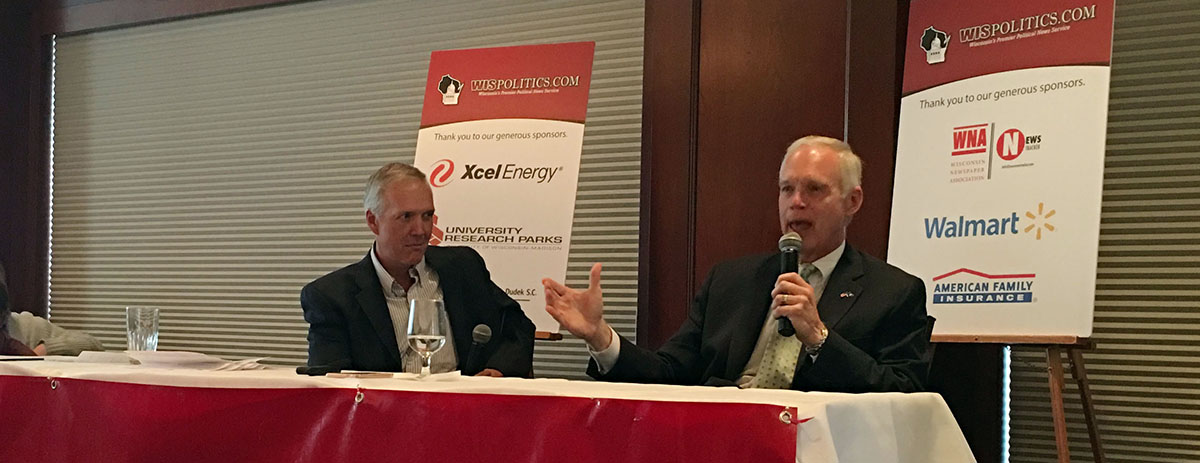A brief video captured while walking on Madison’s Picnic Point.
Music: Kronos Quartet does Sigur Ros.
A brief video captured while walking on Madison’s Picnic Point.
Music: Kronos Quartet does Sigur Ros.
UPDATED:
Listen to this event via a mp3 audio file. My question begins at about 30:40 of the 58 minute event.

I often try to attend WisPolitics’ periodic lunches. These events feature members of the political class, including elected officials, candidates, lobbyists and many other parts of the “machine”.
The meetings are a rare opportunity to publicly question our elected officials [3].
And so it was on Friday, that current US Senator Ron Johnson, running for re-election in 2016, participated in a WisPolitics event.
My question:
I am glad that you mentioned liberty and accountability (in your opening remarks).
During the past few years, the CIA has admitted hacking into the Senate computers [1] and the Director of National intelligence acknowledged lying to Congress [2]. Both are felonies. Yet, nothing has been done.
You have voted repeatedly for secret courts and domestic spying. How will our grandkids view these decisions?
Johnson defended his votes (I did not get the sense that he understands these issues in depth – see Barton Gellman at Purdue) and mentioned that he has met with members of the “secret courts”. I responded that the lack of oversight does little for most Americans and that the non secret courts have begun to require warrants for certain government actions.
Suggested Reading:
Eben Moglen on Snowden and the future.
Retroactive immunity for US telecom companies.
Behind the European Privacy Ruling That’s Confounding Silicon Valley.
How is NSA breaking so much crypto?.
Another perspective: The Painful Truth About Snowden – John Schindler.
John Oliver interviews Edward Snowden.
The Secret History of American Surveillance.
Suggested Films:
Citizen Four and the Lives of Others.
Listen to this event via a mp3 audio file. My question begins at about 30:40 of the 58 minute event.
Watch it here.

[1] CIA hacks into Senate computers.
[2] Director of National intelligence acknowledged lying to Congress.
[3] A question free Madison appearance: Russ Feingold and Elizabeth Warren.
[4] The Cap Time’s Jessie Opoien posted a thin event summary.
Ron Johnson’s Campaign Website 2010 campaign website via archive.org My archive. @senronjohnson
Russ Feingold’s Campaign Website. 2002 website and 2010 via archive.org My archive. @russfeingold
China is launching a comprehensive “credit score” system, and the more I learn about it, the more nightmarish it seems. China appears to be leveraging all the tools of the information age—electronic purchasing data, social networks, algorithmic sorting—to construct the ultimate tool of social control. It is, as one commentator put it, “authoritarianism, gamified.” Read this piece for the full flavor—it will make your head spin. If that and the little other reporting I’ve seen is accurate, the basics are this:
Henry Farrell and Abraham Newman:
The European Court of Justice, Europe’s highest court, has just ruled that the Safe Harbor, an arrangement between the European Union and the United States allowing for the transfer of personal data, is legally invalid. Few non-specialists have heard of the Safe Harbor. Even so, this ruling is going to send shock waves through both Europe and the United States. Here’s how it happened (we talk about the implications in a separate post).
The Safe Harbor is the cornerstone of transatlantic e-commerce
Over the last 15 years, major U.S. e-commerce firms, such as Facebook, Google, Microsoft and Amazon, have developed big markets in Europe. They all rely on an arrangement called “Safe Harbor” to export personal data from Europe to the United States. The Safe Harbor was negotiated between Europe and the United States after a previous transatlantic dispute in which Europe threatened to stop transatlantic data flows. Europe has comprehensive legislation guaranteeing the privacy of E.U. citizens and preventing businesses from using their personal information in various potentially harmful ways. The United States does not have comprehensive privacy legislation (although it does protect the data of U.S. citizens against government intrusions, and provides some protections, e.g. for health data).
A few years back, David Neeleman, the founder of JetBlue Airways, left his company and launched a new airline in Brazil. The airline, Azul, flies 22 million people a year, employs 12,000 people, and is the fastest-growing carrier in the region.
You’d think running such a large, complex operation would require a move to South America. But Neeleman commutes to Azul’s Sao Paulo headquarters every week from his home in Connecticut, taking the 10-hour redeye on Sunday nights and returning on Thursdays. This way, he says, he doesn’t have to uproot his family of 10 kids.
“My wife wasn’t so interested in moving,” said Neeleman, who recently bought TAP, Portugal’s national airline and is now commuting there as well. “We had all these kids playing [American] football and lacrosse. They don’t have those sports in Brazil.”

















